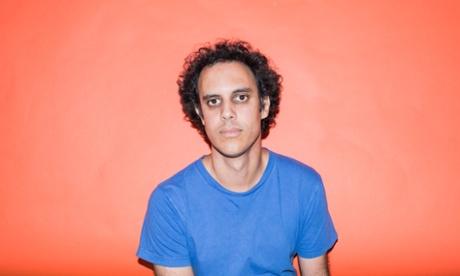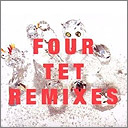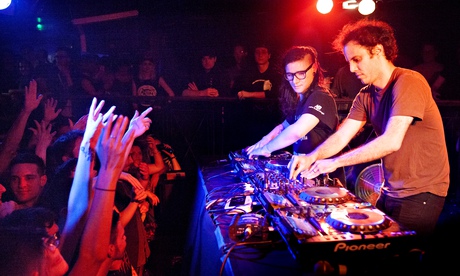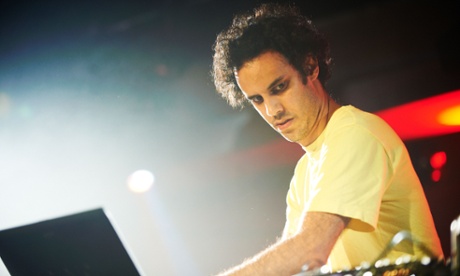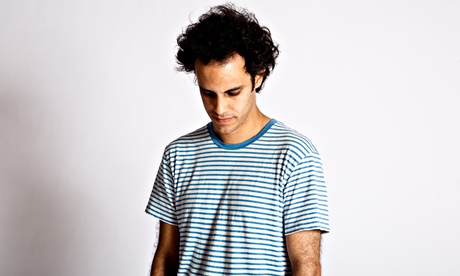In a bijou cafe near King’s Cross, Kieran Hebden sits under a meteorite-sized glitter ball, sipping at a ginger beer and looking uncommonly relaxed. Yesterday morning he suddenly released Morning/Evening – his new album as Four Tet and his first in two years – on Bandcamp. There was no press hype and no marketing campaign. Many musicians would now be fretting about critical reception, midweek chart positions, the haters. But with Hebden, you just sense a come-what-may acceptance. “One thing about running everything myself is that everything is flexible,” he says of his decision to casually put his album online. “A few days ago I was like, it’s the summer solstice, a lovely day – this is perfect.”
Hebden hasn’t done an interview for over a year, but he’s hardly guarded: on the contrary, our two-hour conversation feels as if he’s trying to compress 18 months of thoughts about music, life and the universe into my recorder. He’s one of the UK’s most dedicated club DJs, capable of holding a room in sweaty excelsis for eight hours without pause. As a musician, meanwhile, he channels his influences – cosmic jazz, techno, psychedelia, new age music – into records that feel uplifting and organic, full of warmth and light, intricately woven together from a vast “sound diary” of samples (he has 700 bass drum sounds alone). Making music, he says, is therapeutic: “I want to be able to look back when I’m an old man and have these records tell a story.”
After releasing his first album, Dialogue, in 1999, Hebden played the music industry game for a decade: regular albums, frequent touring, press campaigns. He recalls “days of phoners, like: ‘Do you have a message for your fans in Brazil?’ You spent 90% of your energy trying to reach out to this casual audience who might buy your records; that’s what the record company’s efforts go into, pushing it beyond its ordinary scope.” In the end, he just thought: “Who cares about this? It’s inefficient.”
So, following 2010’s There Is Love In You, Hebden made the decision to simplify his affairs. He concentrated on DJing, collaborating with myriad musicians (Jamie xx, Roots Manuva, Atlanta rapper Rome Fortune and the Syrian dabke musician Omar Souleyman in 2015 alone) and making 12-inch records for a loyal fanbase who clear them out on the day of release. “I was thinking: ‘What it would be like if I eliminate all those things that get in the way of what I’m really trying to do, which is make music and hang out with my child?’ I decided no more record label, no more press people. I started abandoning things and feeling very zen about it.”
The physical version of Morning/Evening will be released on Hebden’s own label, Text – and if you’re looking for a word to describe it, “zen” feels appropriate. It is separated into two sides, Morning and Evening, each running to around 20 minutes in length, and encompassing bumping kickdrums, glowing synths and the voice of Indian soundtrack singer Lata Mangeshkar. Hebden is half-Indian on his mother’s side and for the first time, he says, his music finds him considering his roots. The influences that underpin Morning/Evening come from a collection of movie soundtracks and devotional music owned by his late grandfather. A young Hebden inherited the records when he died. “I put them all away on a shelf,” he says. “I don’t think I even listened to them.”
In 2013, while Hebden was making the album Beautiful Rewind, his grandma passed away. “It felt like that connection to my Indian family started to fade,” he says. So he dug out his grandfather’s records and found himself obsessed. “I think I never got round to hearing the Indian music that really appealed to me. I heard a lot of bhangra records, or those Bollywood records for the obscure funk tracks. But the blissed-out cosmic stuff – it’s ooh, like, that’s for me.” He particularly latched on to Mangeshkar, known as “the Nightingale of India”. He begun toying with her voice, sampling and manipulating it so it advances and recedes like waves lapping on a beach. “Suddenly it came to me: I see an album in this.” He worked on it for months, little sections at a time, until he was content. “I wanted it to have this undercurrent of techno, and the loudest drums, the hardest groove to come in in the last four minutes. It ends it in the club, because that’s my world now.”
This is always the way Hebden has worked: fixating on aspects of music he loves, and making them his own. Debuting as Four Tet in 1998 with the jazzy 36-minute single Thirtysixtwentyfive, he made a brace of dreamy, downtempo electronica records such as 2003’s Rounds and 2005’s Everything Ecstatic that found their way into record collections worldwide. The press, latching on to Hebden’s organic productions and sampling of acoustic instruments, dubbed his sound “folktronica”, a term Hebden mentions today with a shudder. Perhaps he even started to resent his own music, because after his biggest show to date at Hammersmith Palais in 2005, he wondered if Four Tet was done. “But instead of being like: ‘Oh, maybe we can do Brixton Academy, get a lightshow,’ my feeling was: ‘I’ve said what I need to say.’” It was then that he decided to switch up his sound. “I’m quite committed to moving on,” he says. “I have people coming back like: ‘I’m sad it doesn’t sound like Rounds.’ That was 13, 14 years ago. I’ll put out a track that borders on techno and people will be like: ‘What the hell’s this? What happened to folktronica?’”
Hebden found his new direction in London’s club scene, although his route there came through his friendship with two unlikely figures. The first was Steve Reid, a jazz drummer in his 60s who’d played with James Brown and Sun Ra. A mutual friend introduced them and, despite a four-decade age gap, they hit it off, going on to make four records together in three years – Reid on drums, Hebden improvising on electronics. Reid died of cancer in 2010 but the impression he left was permanent. “He’d often have this pulse going underneath things, always speeding the music up from where I might have it… he got me addicted to that tempo.”
The second was Timo Maas, a slightly uncool progressive house producer who scored a UK Top 10 in 2000 with his remix of Azzido Da Bass’s Dooms Night. Maas invited Hebden to join him as resident DJ at central London club The End in 2006. At the time, Hebden felt distanced from dance music. He’d been a clubber around 2000, when UK garage was big (“The ideal mix; very pop and very experimental, both at once”). But he couldn’t get into grime – too aggro – and when dubstep replaced garage’s bright bling with gloomy atmospherics, Hebden’s interest waned. Still, Maas’s invitation intrigued him. “There’s a reason why a lot of the best DJs are the oldest. They’ve experienced every club, they know how to work an audience, to run a sound system, they’re brilliant at it. You go to see Richie Hawtin or Jeff Mills, and maybe the music isn’t as cutting-edge as it was, but in the moment they’re on another level.”
At first it didn’t go well. “At the beginning I kept emptying the room,” he recalls. “But by the end of the residency I could hold it, eight hours, all night.” And so he stayed on, sharing the residency with his friend, the DJ-producer James Holden. “And by the end I was headlining the main room, peak time.” He beams, triumphant: “I’d gone from not knowing what I was doing to being able to go, here I am, I’m going to smash it.”
These days, Hebden loves playing in clubs. Once his parents introduced him to amazing music; now he takes them out to his DJ sets, his mother and godmother joining him in the booth at Trouw in Amsterdam till 7.30am. In April, after linking up via Twitter, he played a back-to-back set with EDM superstar Skrillex in Camden Town. Of course, it went off, even though at one point Skrillex dropped the theme from The Lion King.
That night he did for fun, but Hebden’s tirelessly committed to supporting a more serious club culture, too. He keeps tickets to his all-nighters purposefully low instead of at inflated prices. And when he heard that Shoreditch club Plastic People was closing at the start of this year, he went straight from playing four New Year’s Eve gigs up and down the country with his friend Caribou – an idea inspired by when Status Quo played four arena gigs in one day in 1991 – to manning its decks till sunrise. “The importance of this room really dawned on me,” he says of how Plastic’s People inspired a generation of dancefloor-focused clubbers, as well as himself. “It’s something I’ll talk about til my dying day – the importance of music, the importance of friends.”
It might seem as if Hebden is thoroughly free and easy but he’s not entirely without internal conflict. “My wife laughs at me: ‘You’re not into religion, don’t believe in this or that, but you’re always into all this very spiritual art.’” As an atheist whose music-making is irrevocably tied up with his appreciation of other people’s music, it introduces a dilemma, he says. His favourite musicians, such as John Coltrane and Ali Akbar Khan, were deeply spiritual. “Their records aren’t being made to, you know, make a good record. They’re a communication with God. I definitely have this bee in my bonnet; unless I can speak to God through my laptop, I’m never going to make a great record.”
He discussed this very topic in a talk with Brian Eno in New York. Eno’s answer, he said, was that inspiration could be found in a sense of “surrender” or abandonment. “His analogy was surfing. There’s an enormous amount of control or technique to get you to this place where you can ride a wave. Religious people can let themselves go, find this sense of abandonment.” Eno told Hebden he finds a sense of abandonment singing in a gospel choir. “But after, I was thinking: ‘Yeah, but he hasn’t made a great gospel record, has he?’ You need to find abandonment combined with your best talent.”
Perhaps Hebden is being too hard on himself. Listen to Ba Teaches Yoga, a tribute to his grandma from 2013’s Beautiful Rewind, and you hear a personal moment elevated to something holy. Talking with Hebden as he chats about making music, or the feeling in the room as he DJed that final night of Plastic People, you notice how he describes his life as a series of little epiphanies. At one point, he tells me how he used to make chappatis with his grandmother. “She made the best ones in my family, and after she died, I realised I can never have one again. But I thought: ‘I made them with her many times, I need to start practising.’ So every few days, me and my daughter make chappatis, again and again.”
And now? “They’re OK. Not perfect. They don’t have the elasticity. But these are the sorts of thoughts we have, as we grow older. My grandmother dying, rediscovering these lost records – and the next thing I know, I’ve made an Indian record.”
He grins: “It’s all connected.”
- Morning/Evening is out now on Text. Four Tet plays live at 10x10, part of the Manchester International Festival, on 17 July
